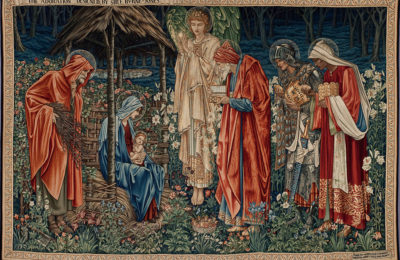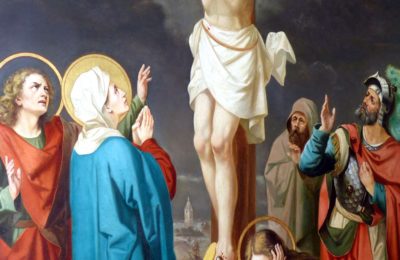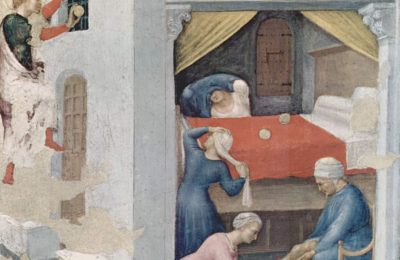Crying, my Little One, Footsore and Weary by Christina Rossetti, 1893:
Crying, my little one, footsore and weary?
Fall asleep, pretty one, warm on my shoulder:
I must tramp on through the winter night dreary,
While the snow falls on me colder and colder.
You are my one, and I have not another;
Sleep soft, my darling, my trouble and treasure;
Sleep warm and soft in the arms of your mother,
Dreaming of pretty things, dreaming of pleasure.
The words of the poem Crying, my Little One, Footsore and Weary by Christina Rossetti might have been spoken by the Blessed Virgin Mary. The Fathers and Doctors of the Church have told us that Our Lady suffered her entire life out of love for God, and for each of us. Her suffering has not often been understood since she did not suffer physical martyrdom; however, though she did not suffer a typical physical martyrdom, she, nonetheless, has been called a martyr. Dr. Taylor Marshall discussed this when he wrote an essay titled Was Mary a Martyr? In this essay Marshall wrote:
Was the Blessed and Immaculate Mother of God a martyr? Unlike Saint Peter, she was not crucified upside down. Unlike Saint Paul, she was not decapitated. Unlike Saint Lawrence, she was not burned alive. Rather, Sacred Tradition holds that she fell asleep peacefully surrounded by the Apostles of Christ her Son. So then, it seems that Mary is not a martyr. Yet, Saint Bernard and many eminent saints and doctors of the Church have described her as the greatest martyr of the Catholic Church – “the more than martyr” to use the words of Saint Bernard.
The prophet Simeon prophesied of the Blessed Mother’s martyrdom when he said to her:
“And your own soul a sword shall pierce, that, out of many hearts thoughts may be revealed” (Lk 2:35).
What did Simeon mean when he told Mary that a sword would pierce her soul? The Church has unanimously taught that this occurred when she looked upon her Son’s dead body on the cross, pierced with the lance of the Roman. Her motherly soul was so sorrowful, so pained, that it might be rightly said that she suffered more than any other human alive. She knew that her Son was divine, that He was sinless, that He was innocent, that He bore the sins and crimes of the world.
Saint Bernard speaks of Mary’s “martyrdom” in this moment in this way (emphasis by SCF):
“The martyrdom of the Virgin is set forth both in the prophecy of Simeon and in the actual story of our Lord’s passion. The holy old man said of the infant Jesus: He has been established as a sign which will be contradicted. He went on to say to Mary: And your own heart will be pierced by a sword.
Truly, O blessed Mother, a sword has pierced your heart. For only by passing through your heart could the sword enter the flesh of your Son. Indeed, after your Jesus – who belongs to everyone, but is especially yours – gave up his life, the cruel spear, which was not withheld from his lifeless body, tore open his side. Clearly it did not touch his soul and could not harm him, but it did pierce your heart. For surely his soul was no longer there, but yours could not be torn away. Thus the violence of sorrow has cut through your heart, and we rightly call you more than martyr, since the effect of compassion in you has gone beyond the endurance of physical suffering.
Or were those words, Woman, behold your Son, not more than a word to you, truly piercing your heart, cutting through to the division between soul and spirit? What an exchange! John is given to you in place of Jesus, the servant in place of the Lord, the disciple in place of the master; the son of Zebedee replaces the Son of God, a mere man replaces God himself. How could these words not pierce your most loving heart, when the mere remembrance of them breaks ours, hearts of iron and stone though they are!
Do not be surprised, brothers, that Mary is said to be a martyr in spirit. Let him be surprised who does not remember the words of Paul, that one of the greatest crimes of the Gentiles was that they were without love. That was far from the heart of Mary; let it be far from her servants.
Perhaps someone will say: “Had she not known before that he would not die?” Undoubtedly. “Did she not expect him to rise again at once?” Surely. “And still she grieved over her crucified Son?” Intensely. Who are you and what is the source of your wisdom that you are more surprised at the compassion of Mary than at the passion of Mary’s Son? For if he could die in body, could she not die with him in spirit? He died in body through a love greater than anyone had known. She died in spirit through a love unlike any other since his. (source)
We owe Our Lady a debt of gratitude: she is the New Eve who tramped on through the winter night dreary, while the snow fell on her colder and colder (paraphrase, Rossetti).
Hail Mary!
~SCF
~Image: Jesus is taken down from the Cross where the Blessed Virgin Mary, St. John the Apostle, and St. Mary Magdalene mourn.






